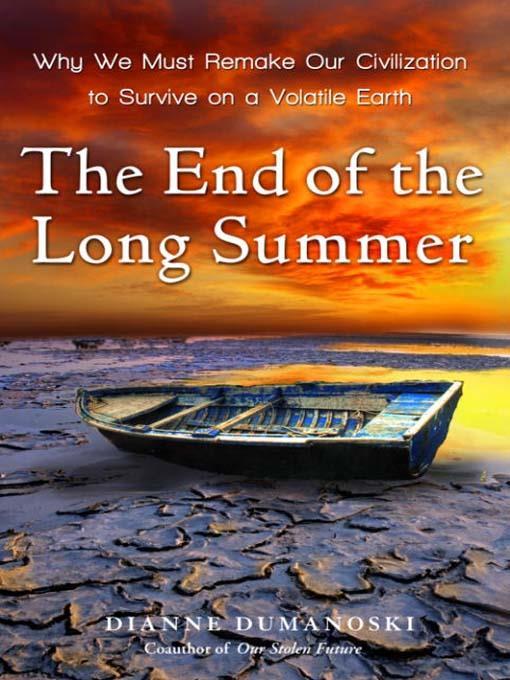
The End of the Long Summer
Why We Must Remake Our Civilization to Survive on a Volatile Earth
کتاب های مرتبط
- اطلاعات
- نقد و بررسی
- دیدگاه کاربران
نقد و بررسی

May 11, 2009
A former environmental journalist, Dumanoski examines how societies are continuing to disregard the inevitability of drastic climate change—even if carbon emission levels dropped to zero overnight—and how world leaders have shown tremendous capacity to put off preparing for the possible eventualities. Fortunately—according to Dumanoski—humanity has reached a seminal moment “when everything is possible,” and the time has arrived for individuals to redefine societal values, to “reconsider not simply the means by which we pursue endless growth, but the wisdom of the goal itself.” Dumanoski recounts relevant scientific and political history to prove her theory that a “tipping point” has been reached. Her theories on the possible consequences of climate change are well reasoned and thought provoking, but her ruminations on the history of human hubris dominate the book and prove so effective that they leave the reader feeling depressed rather than convinced of her optimism. Time alone will determine whether she is an uncannily prescient thinker or an environmentalist Chicken Little.

May 15, 2009
A passionate, precise account of climate change and a persuasive strategy for dealing with"Nature's return to center stage as a critical player in human history."
Though the media usually bemoans global warming from vast industrial carbon-dioxide release, science and environmental journalist Dumanoski (co-author: Our Stolen Future: Are We Threatening Our Fertility, Intelligence, and Survival?, 1996) describes additional problems such as"global fertilization" from fertilizer runoff, which pours into oceans and causes explosive growths of algae that result in dead zones with oxygen levels too low to support animal life. The author interviews scientists who agree that human activity is quickening climate change, but they add that this is not necessarily a gradual process. New research reveals that when certain factors—rising carbon-dioxide levels, melting polar ice—reach a"tipping point," changes in weather, temperature or sea level can occur with disastrous speed—within decades. Turning to solutions, the author avoids the usual jeremiad about returning to simple village life, instead delivering an insightful overview of our evolution. Humans, she points out, have adapted to every conceivable environment from the arctic to desert wastelands to jungles. Since we are capable of not merely existing but thriving in a world without unlimited energy and consumer goods, it's necessary to continue to be proactive, rather than fleeing the problems confronting our planet. This will require numerous short-term sacrifices to achieve long-term benefits, notes Dumanoski, and leaders must strongly advocate for policies that address the many environmental changes to come—despite their unpopularity.
Readers will find the author's arguments convincing but may worry about the prospect of carrying them out.
(COPYRIGHT (2009) KIRKUS REVIEWS/NIELSEN BUSINESS MEDIA, INC. ALL RIGHTS RESERVED.)

Starred review from June 1, 2009
Science journalist Dumanoski proceeds from the established facts that 1) human activity is rapidly shifting the balance of atmospheric gases away from historic normality, and 2) civilization has flourished during an 11,700-year periodan unusual long summerof climatic stability. In subsequent chapters remarkable for lucidly explaining such matters as how ozone is destroyed by refrigerant gases and other manufactured compounds and what ice cores containing thousands of years worth of trapped air reveal about climate change, she unsensationally impresses upon us how factual those two propositions are. Now the first is affecting the second, she says, such that the long summer is about to give way to conditions that will make agriculture and other mainstays of current human life vastly more difficult, if not impossible. With personable authority, she makes the case for familiar environmentalist prescriptions as well aswhich will surprise manymuch that is usually considered culturally conservative (indeed, this isnt an ideologically progressive tract at all). She concisely and trenchantly questions globalizations effects on agriculture and traditional emergency preparedness. She cautions against trusting technology to handle all emergent catastrophes but for faith in what humanity outstandingly proved in the hundreds of millennia of dire weather before the long summer; namely, its prodigious adaptiveness. The popular environmental book of the year? Could be, and of many more to come.(Reprinted with permission of Booklist, copyright 2009, American Library Association.)

























دیدگاه کاربران